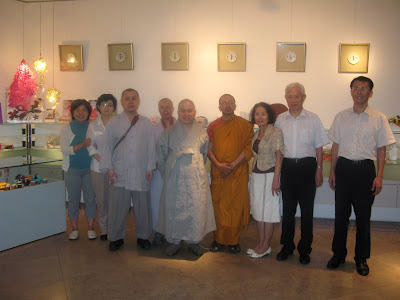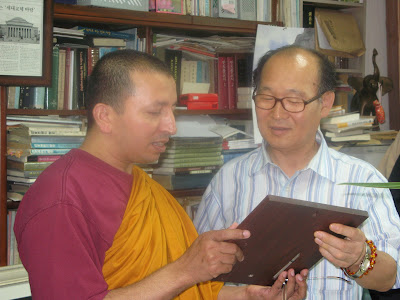skip to main |
skip to sidebar










 My last day in Seoul was a special day. It was Tuesday 29th July. Ven. Han Bo Kwang had invited Ven. Misan, Ven. Chongdok and me to visit his temple, Jungtosa, which is dedicated for Pure Land practices. At the time of our visit, the temple had begun 100,000 chanting of nembutsu (recitation of the name) of Amida Buddha of Western Paradise (sukhavati). When we arrived in Jungtosa, Ven. Bo Kwang, who is also the Director of Electronic Buddhist Text Institute (EBTI) and Professor of Department of Zen Studies with specialization of Dogen studies at Dongguk University, welcomed us and performed the traditional tea ceremony. Afterwards, we were invited for a special lunch offered on Lotus leaf with noodles made of Lotus. This was an extraordinary treat. As a Sri Lankan, I had heard that eating from Lotus leaf was very common in ancient Sri Lanka but had no previous experience of such a lunch. After lunch we returned to Dongguk University for Ven. Misan's lecture on Seon Meditation practice. I had a busy evening with farewell parties and meetings and receiving gifts. The patrons of Sangdo Meditation Center offered me a special cake, special music with Piano playing and a gift that reminds me of the search for bodhi.
My last day in Seoul was a special day. It was Tuesday 29th July. Ven. Han Bo Kwang had invited Ven. Misan, Ven. Chongdok and me to visit his temple, Jungtosa, which is dedicated for Pure Land practices. At the time of our visit, the temple had begun 100,000 chanting of nembutsu (recitation of the name) of Amida Buddha of Western Paradise (sukhavati). When we arrived in Jungtosa, Ven. Bo Kwang, who is also the Director of Electronic Buddhist Text Institute (EBTI) and Professor of Department of Zen Studies with specialization of Dogen studies at Dongguk University, welcomed us and performed the traditional tea ceremony. Afterwards, we were invited for a special lunch offered on Lotus leaf with noodles made of Lotus. This was an extraordinary treat. As a Sri Lankan, I had heard that eating from Lotus leaf was very common in ancient Sri Lanka but had no previous experience of such a lunch. After lunch we returned to Dongguk University for Ven. Misan's lecture on Seon Meditation practice. I had a busy evening with farewell parties and meetings and receiving gifts. The patrons of Sangdo Meditation Center offered me a special cake, special music with Piano playing and a gift that reminds me of the search for bodhi.

 An international workshop sponsored by Institute of Electronic Buddhist Texts & Culture Content of Dongguk University was held today under the title of "Constructing the New Catalog for the Chinese Buddhist Canon." This workshop was attended by scholars from Taiwan, Korea, USA, Hungry and UK. The keynote speaker was Professor Lewis Lancaster of University of California and the guests were welcome by Professor Bokwang Sunim, Director of EBTI at Dongguk University.
An international workshop sponsored by Institute of Electronic Buddhist Texts & Culture Content of Dongguk University was held today under the title of "Constructing the New Catalog for the Chinese Buddhist Canon." This workshop was attended by scholars from Taiwan, Korea, USA, Hungry and UK. The keynote speaker was Professor Lewis Lancaster of University of California and the guests were welcome by Professor Bokwang Sunim, Director of EBTI at Dongguk University.







 Since we arrived in Seoul on 30th June, we have been very busy. We visited many places and met many people who are interested in us. I have been late in reporting some of those important encounters and events. One of the first things that I did when I arrived in Seoul was meeting Ven. Dr. Misan Sunim. In the afternoon of 30th June, Professor Stephen F. Teiser (D.T. Suzuki Professor in Buddhist Studies, Princeton University, USA) who was teaching a summer course at Seoul National University, visited Sangdo Meditation Center and we were served tea by Misan Sunim in a traditional Buddhist manner. After visiting Sunim's temple, both of us were taken to Nuns' cafe located in another part of Seoul where we were served coffee by Buddhist nuns. This is a new development in modern Korean Buddhism to make Buddhism accessible to the public. The nuns' cafe is a very attractive place like the Sangdo Meditation Center. Both places are new. Misan Sunim invited both of us join him to visit Kasan Institute of Buddhist Culture on 2nd July 2008. This research institute is a very special place. It was founded in 1990 by His Holiness Jikwan Sunim, the current President of Jogye Order of Korean Buddhism. Its important research activity is compiling Kasan Encyclopedia of Buddhism. When we arrived at the Kasan Institute of Buddhist Culture we were welcome by the Venerable nun Go OK, the present Director of the institute. We were given a warm reception. We had a tour of the research library and brief meetings with Korean researchers who work there. Our day there ended with an exquisite lunch. As a research institute, I was fascinated to learn about its resources. To my surprise, I learnt that the late Professor Heinz Bechert of University of Gottingen in Germany, who had contributed immensely to the study of Theravada Buddhism, had donated his vast collection of Sinhala, Pali, Sanskrit and other library materials to Kasan Institute of Buddhist Culture. We had a fruitful day in the company of a warm and generous gathering.
Since we arrived in Seoul on 30th June, we have been very busy. We visited many places and met many people who are interested in us. I have been late in reporting some of those important encounters and events. One of the first things that I did when I arrived in Seoul was meeting Ven. Dr. Misan Sunim. In the afternoon of 30th June, Professor Stephen F. Teiser (D.T. Suzuki Professor in Buddhist Studies, Princeton University, USA) who was teaching a summer course at Seoul National University, visited Sangdo Meditation Center and we were served tea by Misan Sunim in a traditional Buddhist manner. After visiting Sunim's temple, both of us were taken to Nuns' cafe located in another part of Seoul where we were served coffee by Buddhist nuns. This is a new development in modern Korean Buddhism to make Buddhism accessible to the public. The nuns' cafe is a very attractive place like the Sangdo Meditation Center. Both places are new. Misan Sunim invited both of us join him to visit Kasan Institute of Buddhist Culture on 2nd July 2008. This research institute is a very special place. It was founded in 1990 by His Holiness Jikwan Sunim, the current President of Jogye Order of Korean Buddhism. Its important research activity is compiling Kasan Encyclopedia of Buddhism. When we arrived at the Kasan Institute of Buddhist Culture we were welcome by the Venerable nun Go OK, the present Director of the institute. We were given a warm reception. We had a tour of the research library and brief meetings with Korean researchers who work there. Our day there ended with an exquisite lunch. As a research institute, I was fascinated to learn about its resources. To my surprise, I learnt that the late Professor Heinz Bechert of University of Gottingen in Germany, who had contributed immensely to the study of Theravada Buddhism, had donated his vast collection of Sinhala, Pali, Sanskrit and other library materials to Kasan Institute of Buddhist Culture. We had a fruitful day in the company of a warm and generous gathering.

























































